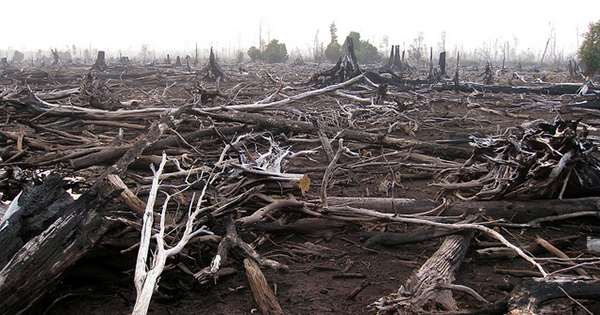
Of all the changes humans have made to the planet, nothing is so startlingly obvious as our transformation of the landscape. We have razed forest and savannah to create monoculture farmland, flattened mountains, greened deserts, and built cities atop swathes of marshland.
Scientists looking for landscape changes in the distant past, such as those wrought during ice ages, when large temperate areas were covered with glaciers, can probe the rocks for fossils or seek answers in the shape of a valley or cliff. Core samples drilled into ice or sedimentary layers might likewise reveal a warmer past, populated by long-extinct species.
Previously, changes like these have always resulted from uncontrollable natural events, such as an asteroid strike or the eruption of super volcanoes. But now humans are leaving equally profound marks on the world. Even in the geologically brief decades since the Industrial Revolution, and even since World War II, we have triggered transformations that will reveal themselves in chemical, physical, and biological signatures to geologists in the far future.
Human-made changes are exactly that—due to things like population size and cultural practices. But perhaps the most important factor of all is politics, which determines whether a society is at war or peace, rural or urban, agrarian or industrializing, concentrated or spread out, and so on. Political decisions leave their traces in the rocks just as surely as the asteroid that wiped out the dinosaurs. Lake sediments in Romania, for example, reveal the intensive farming of Nicolae Ceaușescu’s communist regime, the Chernobyl accident in nearby Ukraine, and the agricultural changes of the early 1990s after Ceaușescu’s fall. And war continues to reshape our planet’s geological history, from the radioactive signature of atomic tests to craters left by explosives, as well as unexploded ordnance that will eventually fossilize within the rock strata.
Some of the most fundamental changes to the global landscape—melting glaciers, disappearing rainforests, drying continents—are the result of political decisions made in democratic countries. If we want to address some of these problematic changes, politics would be a good place to start. President Obama’s pledge to cut greenhouse gas emissions by almost one-third of 2005 levels may help protect glaciers. But it will take more, much more, than just that. Brazil’s decision to water down its successful environmental law and Forest Code, for example, has led to a recent explosion in deforestation in the Amazon—and stands as an example of the work that remains to be done.

